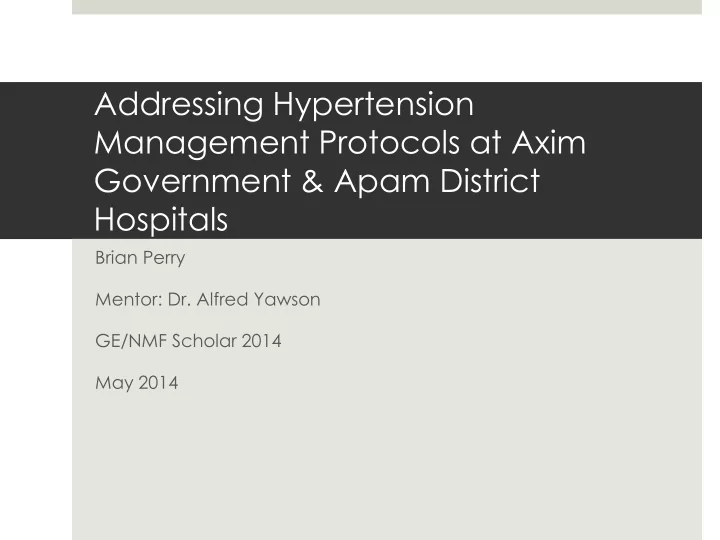

Addressing Hypertension Management Protocols at Axim Government & Apam District Hospitals Brian Perry Mentor: Dr. Alfred Yawson GE/NMF Scholar 2014 May 2014
Study Aims The aims of this project are to: 1. Explore the knowledge base of hypertension management amongst hospital staff at Axim Government Hospital and Apam District Hospital 2. Highlight situations where IV Lasix would resolve in morbidity especially in the setting of acute renal failure 3. Suggest an alternative approach to the current hypertensive protocol 4. Facilitate educational exercises with local health care professionals to implement a safer approach to the management of chronic hypertension and hypertensive urgencies/emergencies.
Hypertension Statistics
Hypertension Statistics: Axim
Hypertension Statistics: Apam
Standard Treatment Guidelines
Standard Treatment Guidelines
Approved Antihypertensive Medications
Approved Antihypertensive Medications
Methods On April 7, 2014 an hour and a half lecture training session was given Attended by 36 health care professionals including nurses, midwifes, PA’s, and local physicians A 10 question pretest and post test was given Employees were instructed to read up on hypertension Due to time constraints, the 1 week followup post-test was unable to be administered
Methods On April 23, 2014 an hour workshop was held Attended by 29 health care professionals including nurses, midwifes, PA’s, and local physicians A 10 question pretest and post test was given Answers to the post-test were reviewed following the lecture The following week, the same test was given to assess knowledge retention rates Due to holidays and varying work schedules, only 10 exams were administered
Methods Lecture Objectives Review basic cardiac physiology and hypertension definitions 4 objectives of managing high blood pressure Stratify patients into 4 treatment categories based on their blood pressure and risk factors Describe elements of lifestyle modification (including health education and behavioral change strategies) Formulate basic management plans for the longitudinal care of patients with HPT Highlight the most common hypertensive emergencies where emergent blood pressure reduction is warranted
Lecture Footage
Results Axim Apam Attendance: 36 Attendance: 29 Administered Quizzes: Administered Quizzes: N=21 N=20 Incomplete Post-Test: Incomplete 1wk Post- N=3 Test: N=9 Pretest Avg: 57.1% Pretest Avg: 69.6% Post Test Avg: 73.8 Post-Test Avg: 77% 1 Wk Follow up Post- Test: 100%
Results (Axim) 80 73.8% N = 18 70 57.1% 60 N = 21 50 Pre-Test 40 30 Post- 20 Test 10 0 Group Average
Results (Apam) 120 100% N=11 100 77% 80 N=20 69.5% Pre-Test N=20 60 Post-Test 40 1 Wk Post- 20 Test 0 Group Average
Limitations Axim Limitations Not enough tests available due to unexpected turnout Inability to identify people due to instructions to put initials instead of full name No Post-Test review of answers Difficulty in administering post test post site visit Not as many data points as Apam (ward, 1wk exam, etc) Apam Limitations Smaller sample size of 1 wk follow up
Future Directions Appoint the employees with the highest scores who have demonstrated enthusiasm as continuing medical education liaisons This person will be responsible for creating clinical vignettes to be administered to hospital staff Ensuring patient safety and adherence to protocols Brainstorm incentives for high performing health care professionals Monitor the management logs to ensure appropriate treatment Data analysis: Stratify questions by concept to highlight areas of improvement
Case 58F w/ a PMH of chronic HTN who has been noncompliant with medications presents to the A&E complaining of new onset palpitations and mild intermittent substernal chest pain that started around 8am. She reports dizziness, visual changes, nausea, oliguria , and headache, but denies dyspnea, diaphoresis, pleuritc chest pain, and lower extremity edema Physical Exam revealed a blood pressure of 220/108 and a tachycardic HR of 106. She had bounding carotid pulses, a 3/6 systolic murmur, and a displaced PMI. She was clear to auscultation bilaterally. No cyanosis, clubbing or edema
Case This clinical scenario is most likely consistent with A. Hypertensive Urgency B. Hypertensive Emergency C. Acute Pulmonary Edema D. None of the above
Case What is the next best step in management? A. Administer STAT Lasix 80mg IV q2hr until symptoms resolve B. Administer Hydralazine 5mg IV STAT followed by 5-10mg q10mins until BP is stabilized at a SBP of 180mmHg C. Administer Lisinopril 40mg PO AND Nifedipine 90mg PO and monitor patient in the A&E until his blood pressure improves before discharging him on oral medications. D. Start patent on Dobutamine 20mcg/kg/min to optimize cardiac contractility E. None of the above
Case The patient given a hypertensive urgency diagnosis and was given Lasix 160mg IV, Diazepam 20mg and 500cc of DNS. She was transferred to the female ward and was discharged overnight.
Questions????
Recommend
More recommend